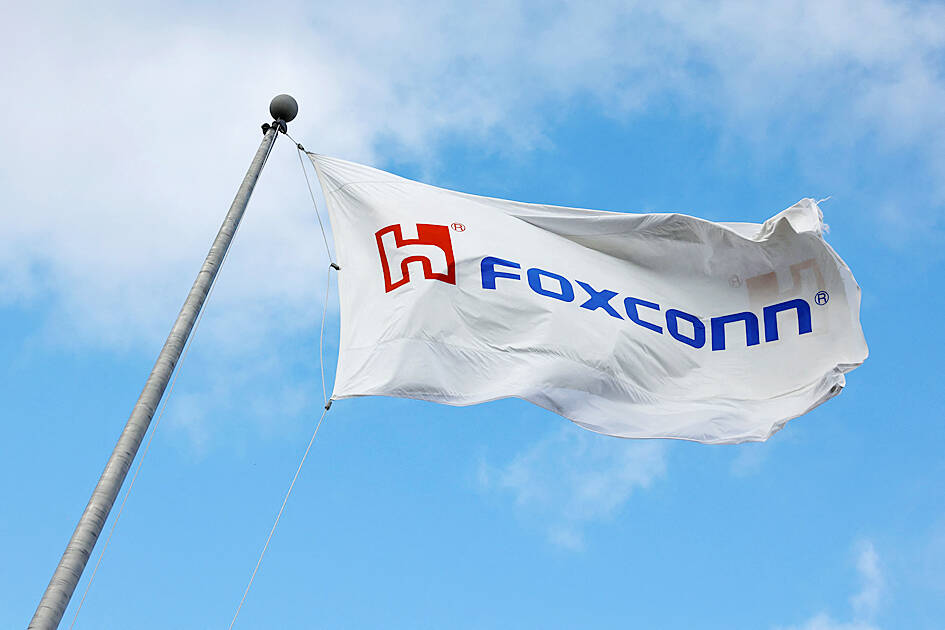Hon Hai Technology Group (鴻海科技集團) yesterday named former Nidec Corp boss Jun Seki the chief strategy officer of its electric vehicle (EV) venture, making the first high-profile hire for a business the iPhone maker hopes will carve out new markets.
Seki, who left Nidec last year after company founder Shigenobu Nagamori removed him as CEO, is expected to help drive one of Hon Hai’s newest priorities.
The Taiwanese firm accelerated its push into the automotive industry over the past year by acquiring a pickup assembly plant from embattled Lordstown Motors Corp in the US and showcased several EV prototypes.

Photo: Reuters
It had not made any prominent hires before announcing the 61-year-old Seki’s appointment yesterday.
Hon Hai, known as Foxconn Technology Group (富士康科技集團) internationally, has been bolstering efforts to secure new revenue after grappling with thin margins and unprecedented COVID-19-induced challenges in China, including a violent protest at its main iPhone assembly site in Zhenzhou in November last year.
The Taiwanese company expects its EV business to start contributing meaningful revenue this year, and has targeted a 5 percent market share by 2025, Hon Hai chairman Young Liu (劉揚偉) has said.
Seki spent fewer than three years at the world’s biggest manufacturer of electric motors. He was demoted last year, after Nagamori blamed him for the Japanese company’s poor performance.
Seki has decades of experience in automobiles, including with Nissan Motor Co and China’s Dongfeng Motor Co (東風汽車).
“Mr Seki’s rich management experience in the Japanese auto industry and global EV supply chains will assist the group in integrating EV resources and development in the Americas, Asia, and the Middle East,” Hon Hai said in a statement.
Seki is to report directly to Liu and his appointment is effective from tomorrow, it said.

Taiwan would remain in the same international network for carrying out cross-border payments and would not be marginalized on the world stage, despite jostling among international powers, central bank Governor Yang Chin-long (楊金龍) said yesterday. Yang made the remarks during a speech at an annual event organized by Financial Information Service Co (財金資訊), which oversees Taiwan’s banking, payment and settlement systems. “The US dollar will remain the world’s major cross-border payment tool, given its high liquidity, legality and safe-haven status,” Yang said. Russia is pushing for a new cross-border payment system and highlighted the issue during a BRICS summit in October. The existing system

Convenience store operator Lawson Inc has registered trademarks in Taiwan, sparking rumors that the Japanese chain is to enter the local market. The company on Aug. 30 filed trademarks for the names Lawson and Lawson Station, according to publicly available information from the Ministry of Economic Affairs’ Intellectual Property Office. The product categories on the application include some of Lawson’s top-selling items for use in the convenience store market. The discovery has led to speculation online that the popular Japanese chain is to enter the Taiwanese market. However, some pointed out that it might be a preemptive application to avoid others from co-opting the

Taiwan Semiconductor Manufacturing Co (TSMC, 台積電) is expected to grow its revenue by about 25 percent to a new record high next year, driven by robust demand for advanced technologies used in artificial intelligence (AI) applications and crypto mining, International Data Corp (IDC) said yesterday. That would see TSMC secure a 67 percent share of the world’s foundry market next year, from 64 percent this year, IDC senior semiconductor research manager Galen Zeng (曾冠瑋) predicted. In the broader foundry definition, TSMC would see its market share rise to 36 percent next year from 33 percent this year, he said. To address concerns

Intel Corp chief financial officer Dave Zinsner said that a formal separation of the company’s factory and product development divisions is an open question that would be decided by the chipmaker’s next leader. Zinsner, who is serving as interim co-CEO following this month’s ouster of Pat Gelsinger, made the remarks on Thursday at the Barclays technology conference in San Francisco alongside co-CEO Michelle Johnston Holthaus. Intel’s struggles to keep pace with rivals — along with its deteriorating financial condition — have spurred speculation that the next CEO would make dramatic changes. That has included talk of a split of the company’s manufacturing